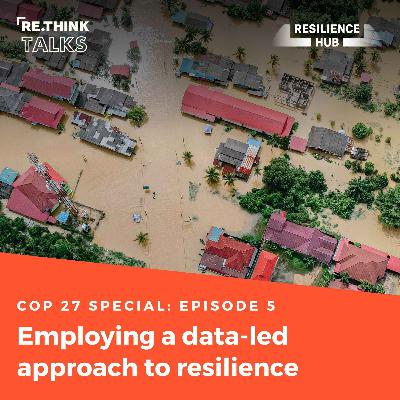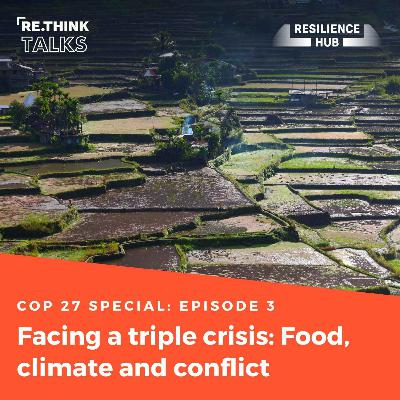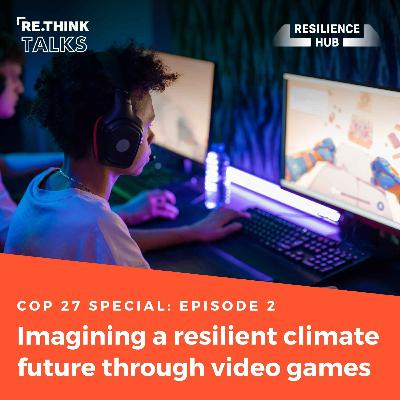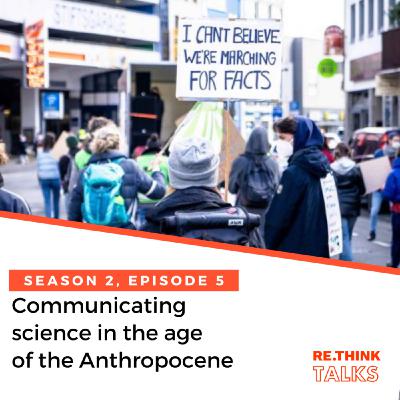Discover Rethink Talks
Rethink Talks

Rethink Talks
Author: Stockholm Resilience Centre, Stockholm University
Subscribed: 22Played: 192Subscribe
Share
© Stockholm Resilience Centre, Stockholm University
Description
From pandemics to production supply chains: how do we make sense of the complex world we live in? Every month, we bring together the best thinkers and practitioners within resilience thinking and sustainability science, to discuss how we can achieve a sustainable planet that enables well-being for all. Rethink talks provides you with the latest science on global development. Subscribe to our podcast by searching for “Rethink Talks” on Spotify or any of the major podcast platforms. Read more: www.rethink.earth
Hosted on Acast. See acast.com/privacy for more information.
26 Episodes
Reverse
Does practice make perfect? Do countries become more resilient to disasters the more they experience them? Or does their resilience break down when disasters strike again and again?Today’s guest is Sarah Cumbers, Evidence and Insight Director at the Lloyds Register Foundation. She shares the latest data from the foundation’s World Risk Poll. The poll asked people around the globe about their perceptions on risk and safety with the aim of understanding where strengths lie and what can be improved. Your host is Annette Hertwig.About Rethink TalksRethink Talks is Stockholm Resilience Centre’s podcast series on resilience thinking and global change. It spotlights conversations between experts on a range of topics that highlight how resilience thinking and biosphere stewardship add value to current debates.This season of the podcast is a collaboration between the Stockholm Resilience Centre and the Resilience Hub, released during and after COP27. Hosted on Acast. See acast.com/privacy for more information.
The seas are getting crowded. As commercial use of the ocean accelerates exponentially and climate change impacts worsen, marine ecosystems and coastal communities are feeling unprecedented pressures. The ocean has been a source of food since the dawn of time, it facilitates our modern communication, transports our merchandise and is often perceived as a lawless, new economic frontier.This episode's guest, Jean-Baptiste Jouffray, who is a researcher at the Stockholm Resilience Centre, expands on the new ocean reality. He proposes that the ocean may not be as lawless as we think and that we need to ramp up investment and stewardship of the vast waters that are giving us so much. Host for this episode is Annette Hertwig.About Rethink TalksRethink Talks is Stockholm Resilience Centre’s podcast series on resilience thinking and global change. It spotlights conversations between experts on a range of topics that highlight how resilience thinking and biosphere stewardship add value to current debates.This season of the podcast is a collaboration between the Stockholm Resilience Centre and the Resilience Hub, released during COP27. Hosted on Acast. See acast.com/privacy for more information.
Food insecurity, climate change and conflict are placing considerable pressure on the global food system. Inequality, access to land, access to nutrient-rich foods, and the loss of local food cultures and diversity are realities further amplified in the new risk landscape. These challenges are also playing out differently depending on the region you inhabit. In other words, the global south and the global north are both feeling the pressure, however, in disparate ways.This episode's guests Cibele Queiroz and Albert Norström discuss the challenges our global food systems face and explore ways through which we can move towards more resilient, sustainable and just food systems. Albert Norström is a researcher at the Stockholm Resilience Centre and head of knowledge and evidence at the Global Resilience Partnership. Cibele Queiroz is a researcher at the Stockholm Resilience Centre and Global Resilience Partnership. Your host is Annette Hertwig.About Rethink TalksRethink Talks is Stockholm Resilience Centre’s podcast series on resilience thinking and global change. It spotlights conversations between experts on a range of topics that highlight how resilience thinking and biosphere stewardship add value to current debates.This season of the podcast is a collaboration between the Stockholm Resilience Centre and the Resilience Hub, released during COP27. Hosted on Acast. See acast.com/privacy for more information.
What if decision-makers could live through and feel the future consequences of climate change in action today? Would it influence their policy choices? And could gaming or virtual reality simulations help to prioritize action in climate adaptation and resilience building?Video games have evolved beyond pure entertainment and now have the potential to reach a global community of 3 billion people with climate resilience skills and promote behavioural change.Today's guests, video game consultant Chance Glasco and Rosemary Mann from the Arsht-Rock Resilience Center, share their experience in creating gaming technologies for world leaders. Your host is Annette Hertwig. About Rethink TalksRethink Talks is Stockholm Resilience Centre’s podcast series on resilience thinking and global change. It spotlights conversations between experts on a range of topics that highlight how resilience thinking and biosphere stewardship add value to current debates.This season of the podcast is a collaboration between the Stockholm Resilience Centre and the Resilience Hub, released during COP27. Hosted on Acast. See acast.com/privacy for more information.
Droughts, storms or sea water rise – climate change takes its form almost always through a change in water. But water is more than just a destructive force, it is the bloodstream of the biosphere.In this episode Lan Wang Erlandsson, a researcher at the Stockholm Resilience Centre, shares with us how freshwater can make or break our ability to successfully combat climate change. She also explains why climate policies must look beyond transitions to renewable energy. Your host is Annette Hertwig.Further reading for this episodeUnpacking freshwater's role in climate change mitigationFreshwater boundary exceeds safe limits About Rethink TalksRethink Talks is Stockholm Resilience Centre’s podcast series on resilience thinking and global change. It spotlights conversations between experts on a range of topics that highlight how resilience thinking and biosphere stewardship add value to current debates.This season of the podcast is a collaboration between the Stockholm Resilience Centre and the Resilience Hub, released during COP27. Hosted on Acast. See acast.com/privacy for more information.
How can systemic transformations be achieved at the scale, speed, and quality that is needed? And what capacities are required to navigate these transformations?In this episode, Stockholm Resilience Centre researcher Per Olsson talks to Funda Sezgi and François Bonnici about the frontiers of transformation and system change. Sezgi is the co-founder and managing director of the Norrsken Impact Accelerator at Norrsken Foundation, while Bonnici is director of the Schwab Foundation for Social Entrepreneurship, head of social innovation at the World Economic Forum and co-author of the recently published book The Systems Work of Social Change.About Rethink TalksRethink Talks is Stockholm Resilience Centre’s podcast series on resilience thinking and global change. It spotlights conversations between experts on a range of topics that highlight how resilience thinking and biosphere stewardship add value to current debates.Available on all major platforms such as Spotify, YouTube, Apple Podcast and Soundcloud. Hosted on Acast. See acast.com/privacy for more information.
The sixth IPCC report sent a clear message: we are one minute to midnight and the rate and scale of action that is required is immense. However, all too often, the solutions presented are top-down and framed in an outdated North-South perspective. We need voices from the climate change frontline to not only be rightfully acknowledged and valued, but to be learned from as climate adaptation experts.In this episode, Ameil Harikishun, policy officer for the Global Resilience Partnership, talks to Harini Nagendra, director of Research Center and head of Center for Climate Change and Sustainability, both at the Azim Premji University in India. And Saleemul Huq, director of the International Centre for Climate Change and Development in Bangladesh and Professor at the Independent University Bangladesh. With decades of experience combined, they share their insights on locally led adaption and what is needed for it to work. Hosted on Acast. See acast.com/privacy for more information.
No matter where in the world you live, your life is affected by the ocean. But many of our oceans are sick, and have been so for a while. So what’s keeping them from bouncing back to full health? Well, it’s partly down to not agreeing on what a healthy ocean actually looks like that makes it hard to settle on the best course of action. But things might be about to change, albeit slowly.New science-based tools like the Ocean Health Index offer comprehensive assessments of the social, economic, and environmental conditions of an ocean.In this episode, Susa Niiranen talks to Ben Halpern the creator of the Ocean Health Index, and Thorsten Blenckner, a researcher at the Stockholm Resilience Centre who with his team has developed a spin-off called the Baltic Health Index.Together, they explore what it takes to restore an ocean to good health, and to what extent these new assessments can help us reach our goals.More information, including links to mentioned publications: www.rethink.earth/making-our-oceans-healthy-again/ Hosted on Acast. See acast.com/privacy for more information.
How did we get to where we are today and what will it take to move away from it? In this episode, Owen Gaffney talks to Carl Folke, a co-founder of the Stockholm Resilience Centre and one of the most cited scientists in the world across all disciplines. He is also the director of the Beijer Institute for Ecological Economics at the Royal Swedish Academy of Sciences, a member of the US National Academy of Sciences, and has received numerous awards and recognitions over the years.Folke has spearheaded the modern thinking around social-ecological systems and how we must stop considering nature and the environment as something separate from society. He has previously said that he is "embarrassed as a human that we have in two generations created mindsets where we consider ourselves independent of the biosphere".Now, luckily, he says, we are rapidly gaining that perspective again.In this special edition of Rethink Talks, Carl Folke reflects on his own career path, resilience thinking, and why it's important to not be constrained by a certain theory or method when trying to solve a challenge. He also provides a unique glimpse into the launch of the Stockholm Resilience Centre.Read more: https://rethink.earth/carl-folke-on-resilience-the-biosphere-and-the-future-of-our-planet Hosted on Acast. See acast.com/privacy for more information.
The age of humans is messing things up in many different ways. Not only is human pressure on the environment changing the earth system in unprecedented ways, trust in science is faltering while media and journalism remains fragmented. The consequence is a siloed world at a time when trust and collaboration is sorely needed. Science communication requires creativity, joy, perseverance, the courage to try something new and, actively finding ways to work around the weaknesses in the system.In this episode, Andrew Merrie talks to Maddie Stone, a freelance science journalist and previously the managing editor of the Gizmodo Earther ‘Nature for Nerds’ blog. Her work has appeared in outlets such as Vice, National Geographic, Grist, the Washington Post, The Atlantic and more. Andrew also talks to Owen Gaffney, a sustainability communicator and strategist for organizations such as the Stockholm Resilience Centre, the Potsdam Institute for Climate Impact Research and the Global Commons Alliance. Together they ask, how can we share and explain science in a world beset by fast change and a lack of trust? And can science fiction help?More information, including links to mentioned publications: https://rethink.earth/communicating-science-in-the-age-of-the-anthropocene/ Hosted on Acast. See acast.com/privacy for more information.
The ocean has gone from infinite, wild and thriving to finite, fragile and full of garbage. It feeds us, generates most of the air we breathe, helps to regulate our climate, provides treatments for disease and represents a new economic frontier. But we have limited time to get people to pay attention, anticipate change, prepare for surprise and act for a more sustainable ocean future. This is why the UN has introduced the Decade of Ocean science for a ‘once in a lifetime’ opportunity to strengthen the management of our ocean.But will it actually work?In this episode, Andrew Merrie talks to Helen Ågren, Ambassador for the Ocean for the Swedish Ministry of Foreign Affairs and Guillermo Ortuño Crespo, a researcher at the Stockholm Resilience Centre and one the leaders behind the UN Ocean Decade Early Career Ocean Professional Initiative.More information, including links to the mentioned material: https://rethink.earth/he-ocean-science-decade Hosted on Acast. See acast.com/privacy for more information.
In 2009, 28 internationally renowned scientists identified nine processes that regulate the stability and resilience of the entire planet. Provided we stay within these boundaries, humanity can continue to develop and thrive for generations to come. Since its launch the planetary boundaries framework has generated enormous interest within science, policy, and practice. But what does it take to communicate such important knowledge about how our planet works? On June 4th, Netflix launched a documentary on the planetary boundaries, based on the recently released book, Breaking Boundaries. How can films and books like these explain complex scientific findings to a wide and diverse audience? How do we tell a compelling story without compromising scientific integrity? In this episode, Amanda Wood from the Stockholm Resilience Centre talks to Jon Clay, producer of the Breaking Boundaries documentary, and Owen Gaffney, head of international Media and Policy at the Stockholm Resilience Centre and co-author of the Breaking boundaries book. Together they discuss the next frontier in filmmaking and scientific communication. More information: https://rethink.earth/communicating-the-complex-science-behind-the-planetary-boundaries/ Hosted on Acast. See acast.com/privacy for more information.
Despite the world entering the last decade to meet the Sustainable Development Goals (SDGs) biodiversity and ecosystem services remain chronically undervalued and largely missing. As the world is entering the last decade to meet the goals, a change in thinking and approach is needed.In this episode Stockholm Resilience Centre's Albert Norström talks to Liz Selig, deputy director at the Center for Ocean Solutions at Stanford University, and Belinda Reyers from the Stockholm Resilience Centre at Stockholm University and the Future Africa Campus at University of Pretoria in South Africa.They warn that unless action is taken, progress toward the goals is in jeopardy. So the question remains: how can we better capture the role of biodiversity for sustainable development?More information, including links to mentioned publications: https://rethink.earth/1-in-the-sdgs-where-have-biodiversity-and-ecosystem-services-gone/ Hosted on Acast. See acast.com/privacy for more information.
Within calls for transformation, there seems to be a hunger - a hunger to slow down, spend time healing, and to feel more connected; to ourselves, to each other, and to the ecosystems we are a part of.But how can that happen? And can we create that kind of healing at scales large enough that it will contribute to the kinds of transformations that may create a different kind of future.In this episode, Stockholm Resilience Centre's Michele-Lee Moore talks to two experts on what it takes to step away from the status quo and established modes of thinking.Dr. Vanessa Andreotti is an expert on race, inequality, and education and focuses on collective processes for both healing and re-thinking how we create alternative futures, and Dr Per Espen Stoknes, is a psychologist and expert on scenarios and sustainable economics.Together they unravel some of the obstacles that exist for transformation to really happen. Hosted on Acast. See acast.com/privacy for more information.
Every year since 1990, the United Nations Development Programme has published the Human Development Report. The report has increasingly emphasised the links between the environment and human development, and today, on its 30th anniversary, it shows more than ever the importance of a stable climate and resilient ecosystems.In this episode, Fredrik Moberg talks to Pedro Conceição, lead author of the Human Development Report, and Belinda Reyers, senior advisor at the Stockholm Resilience Centre.Together they discuss questions like: In the age of the Anthropocene, why is the Human Development Report still such an important report? And how can resilience thinking contribute to new global development strategies?More information, including links to mentioned publications: https://rethink.earth/the-2020-human-development-report/ Hosted on Acast. See acast.com/privacy for more information.
Science and industry have much to gain from working more closely together. But their methods and expectations can sometimes feel worlds apart. What makes them so different and what is needed to create more successful collaborations?In this episode Lisen Schultz, deputy director of transdisciplinarity at the Stockholm Resilience Centre talks to colleague Henrik Österblom and Darian McBain, director for corporate affairs and sustainability at Thai Union, the world’s largest canned tuna producer. Together they share thoughts and experiences on how it is working together to make the world’s largest seafood companies more sustainable.More information, including links to mentioned publications: https://rethink.earth/what-it-takes-to-make-science-and-business-connect/ Hosted on Acast. See acast.com/privacy for more information.
Right now, the very idea of imagining the future might feel strange when the world is changing in ways we barely even understand. In this episode, we ask, is a safe and just future for all still possible? And what will it take to imagine and enact these kinds of futures? Host Andrew Merrie is joined by two people who spend much of their time thinking about this: Garry Peterson from the Stockholm Resilience Centre and Laura Pereira from the Copernicus Institute of Sustainable Development at Utrecht University.More information, including links to mentioned publications: https://rethink.earth/after-covid-19-imagining-a-safe-and-just-future-for-all/ Hosted on Acast. See acast.com/privacy for more information.
Economies around the world have been shaken by the COVID-19 pandemic and revealed serious vulnerabilities and weaknesses. What can we learn from today’s crisis to build more resilience into our systems?In this episode, host Robert Blasiak talks to Lisen Schultz from the Stockholm Resilience Centre, and Sturla Henriksen, Special Advisor to the United Nations Global Compact, the world’s largest corporate sustainability initiative.More info: https://rethink.earth/building-business-resilience-what-has-covid-19-taught-us/ Hosted on Acast. See acast.com/privacy for more information.
Covid-19 has brought the modern world to its knees. How did we get to this point? This episode of Rethink Talk takes a deep dive into what the coronavirus pandemic says about our world and the change it may go on to trigger.Host Louise Hård Af Segerstad talks to three experts on change and transformation: Marten Scheffer from Wageningen University, Lauren Hermanus, an expert in sustainable development in practice in South Africa, and Michele-Lee Moore from the Stockholm Resilience Centre.Read more: www.rethink.earth/crisis-and-renewal-what-covid-19-says-about-our-world Hosted on Acast. See acast.com/privacy for more information.
COVID-19 has forced governments to take unprecedented steps to recover their economies. At the same time, some parts of the private sector warn they may have to park long-term climate ambitions just to keep their heads above water. This has potentially devastating consequences for sustainability efforts. So how can stimulus packages and investments promote short-term economic recovery without compromising long-term decarbonization and sustainability goals?In this episode, Beatrice Crona, deputy science director of the Stockholm Resilience Centre and executive director of the Global Economic Dynamics and the Biosphere programme at The Royal Swedish Academy of Sciences, talks to Maria Håkansson, CEO of Swedfund, the Swedish Government's Development Finance Institution and Therese Lindahl, director of the Behavior, Economics and Nature Programme at the Beijer Institute of Ecological Economics.More information, including links to mentioned publications: https://rethink.earth/building-back-better Hosted on Acast. See acast.com/privacy for more information.
























